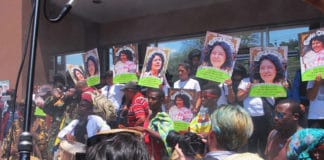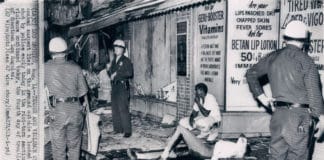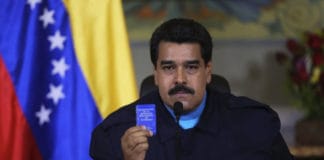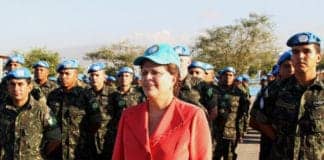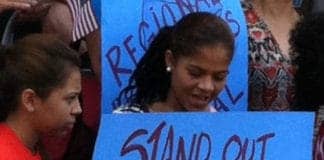Tags Honduras
Tag: Honduras
‘We love the CIA!’ – or how the left lost its...
On July 22 this year, nearly two years after Trump’s election and the rise of “The Resistance,” I tuned in to KPFA-Berkeley’s Sunday Show and heard host Philip Maldari speaking to The Nation’s national affairs correspondent John Nichols. Philip Maldari: John, just last Monday we had this fabulous press conference in Helsinki, Finland, where these two heads of state [Trump and Putin] had a chance to speak to the world. Do you want to decode what happened there? John Nichols: Do I want to what? PM: Decode – explain.
Honduras: Government-supported tourism pushes Garifuna maroons off their land of 200...
In the early 1800s, the government of Honduras awarded 2,500 acres of ancestral land to the Garifuna, descendants of shipwrecked and/or escaped African slaves. The land titles given to the Garifuna communities on the coast of Honduras state that the collective lands cannot be transferred to an outsider, but many Garifuna territories suffer from multiple ownership claims. The Garifuna are struggling to maintain their land.
Honduran movements in mobilization one month after brutal assassination of Berta...
In Honduras, one month since the assassination of Berta Caceres on the 3rd of March, tens of thousands of African and Indigenous Hondurans and those in solidarity have taken to the streets throughout the country with deep sadness and in resistance to the neo-colonial forces at fault for her murder. Impunity is rampant since the 2009 coup d’état, supported by then U.S. Secretary of State Hillary Clinton.
¡Berta lives! The life and legacy of Berta Cáceres
I began writing a eulogy for Berta Isabel Cáceres Flores years ago, though she died only last week. Berta was assassinated by Honduran government-backed death squads on March 3. Like many who knew and worked with her, I was aware that this fighter was not destined to die of old age. She spoke too much truth to too much power. Long may Berta live, in the hearts, minds, passions and actions of all of us.
Sanders and Clinton on ‘the next Rwanda’
Hillary Clinton and Bernie Sanders sparred about U.S. foreign policy in Latin America, and particularly Honduras, during this week’s debate in Miami, Florida. In other debates, they have discussed the Middle East, Libya, Egypt, Russia, China and North Korea, but not Sub-Saharan Africa, aside from a few statements as to whether or not the U.S. should have intervened in Rwanda 22 years ago. KPFA’s Ann Garrison reports.
50th anniversary of the Watts Rebellion, a turning point in the...
Just five days after the signing of the Voting Rights Act of 1965, the Watts Rebellion erupted, lasting several days. Today urban rebellion remains a key element in the struggle of the African American people against national oppression and economic exploitation. Since 2012, with the vigilante killing of Trayvon Martin and the resultant acquittal of George Zimmerman, a rising consciousness and intolerance for racism has been rapidly accelerating.
Venezuela a threat to US national security?
On March 9, 2015, U.S. President Obama issued an executive order declaring a “national emergency” affirming that “the situation in Venezuela” poses an “unusual and extraordinary threat to the national security and foreign policy of the United States.” This is the latest measure of U.S. imperialist meddling in the internal affairs of a sovereign nation like the Bolivarian Republic of Venezuela and as such is strongly condemned by the Hands off Venezuela campaign.
Et tu, Brute? Haiti’s betrayal by Latin America
Without Haiti’s help, there would not have been any independent country in Latin America. On January 1, 1816, when Simon Bolivar arrived in Haiti, downtrodden and desperate for help to fight the Spanish, the only two republics in the Western Hemisphere were the United States, where slave ownership was in force, and Haiti, which had fought for and earned its independence in what is still the only successful slave rebellion ever in the world.
Child refugees: When children are ‘the enemy’
I’ve been watching for days now as media reports display the growing hatred at the arrival of Central American children across the Mexican-U.S. border. American voices crackle with bile as they begin the drumbeat for their immediate deportation. They are refugees from want and war, almost all the result of U.S. interventions in Central America in support of murderous military governments and the mindless drug war.
Call for international solidarity as Colombia prisoners’ hunger strike enters 4th...
On July 25, a prisoner on hunger strike at the Doña Juana Penitentiary in Colombia died after having been refused medical treatment by his guards. He had been experiencing chest pains and asking to see a doctor, but his request was ignored. Soon the prisoner was dead from a heart attack. The next morning, 18 of the hunger strikers sewed their mouths shut in protest, and the hunger strike has risen to 176 participants.
Haiti: The emperor has no votes
On April 4, the Haitian government announced that Michel Martelly won the recent fraudulent “elections” imposed on Haiti by the United States, France and Canada, the so-called “international community,” and sanctioned by the United Nations. Haiti now finds itself at a crossroads.
‘When we say democracy, we have to mean what we say’
Nicolas Rossier conducted an exclusive interview with former Haitian President Jean-Bertrand Aristide in forced exile in Johannesburg. Aristide concludes: "We are poor – worse than poor because we are living in abject poverty and misery. But based on that collective dignity rooted in our forefathers, I do believe we have to continue fighting in a peaceful way for our self-determination, and if we do that, history will pay tribute to our generation." Rally for democracy in Haiti and Aristide's return Wednesday, Nov. 17, 5 p.m., Montgomery & Market, San Francisco.
‘Rebuilding Haiti’: the sweatshop hoax
Within days of a Jan. 12 earthquake that devastated much of southern Haiti, the New York Times was using the disaster to promote a United Nations plan for drastically expanding the country’s garment assembly industry, which employs low paid workers to stitch apparel for duty-free export, mainly to the U.S. market.
Dr. Luther Castillo, voice of the voiceless in Honduras, gets rousing...
“Doctor Luther! Doctor Luther, give it to the Honduras oligarchy hard!” Dr. Luther Castillo, who represents the National Resistance Front against the Military Coup in Honduras, brought to San Francisco the echoes of Cuba’s former President Fidel Castro on Thursday night at the Centro del Pueblo. He spoke for almost two hours with passion, conviction and a keen understanding of the savage rule of the minority oligarchic coup government in Honduras.
Haiti and Honduras: End military coups and occupations
The universal condemnation of the military coup in Honduras by Latin American governments is unprecedented. If this dictatorship is allowed to stay in power, no democratically elected government is safe. Just as President Obama promised a more respectful relationship between the U.S. and the rest of America – we are faced with another coup with U.S. military complicity.
Takeover imminent of Honduras’ Garifuna Community Hospital
Despite objections by local Garifuna communities, Honduras’ de facto government is moving to take over the first and only Garifuna-managed hospital in the country, ousting its current staff. The facility – built by Dr. Luther Castillo, other Garifuna doctors, local architects and the communities themselves – is located in the remote coastal municipality of Iriona. [The Garifuna, descended from Africans who intermarried with native Arawak and Carib people, number about 600,000 on the Caribbean coast of Central America.]
The implications of the coup in Honduras on Afro-descendants
Currently, the country of Honduras in Central America is experiencing its worst political crisis in decades. In the aftermath of the military coup that forcibly removed President Manuel Zelaya Rosales, there have been various developments that have raised our concern about the security of citizens’rights and the impact of the situation on people of African descent.
Live from the streets of San Salvador
The Prisoners of Conscience Committee delegation from the United States returned recently from a fact-finding mission in El Salvador. We were in three cities - San Salvador, Suchitoto and Sansonate - and we talked to former combatants, government officials, union leaders, community leaders, members of street organizations, former political prisoners and more. One of my favorite groups that we met was Radio Zurda, a collective of youth who do a political radio show heard in El Salvador and Honduras, targeted towards a youth audience.

 Store
Store





